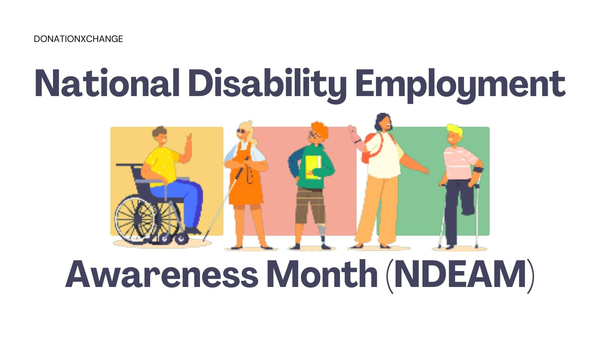October is National Disability Employment Awareness Month

October is National Disability Employment Awareness Month
The Purpose of NDEAM
National Disability Employment Awareness Month (NDEAM) serves as an important and necessary opportunity to raise awareness about disability employment issues and to recognize the contributions of individuals with disabilities to the workforce. The month-long observation, coordinated by the Office of Disability Employment Policy under the U.S. Department of Labor, aims to promote inclusive workplaces and advance access and equity for people with disabilities. NDEAM encourages employers to create inclusive employment policies, foster inclusive workplace cultures, and provide reasonable accommodations for employees with disabilities. By highlighting the capabilities and skills of workers with disabilities, NDEAM challenges stereotypes and misconceptions, promoting greater understanding and acceptance in society. This annual event not only celebrates the achievements of disabled individuals in the workforce but also emphasizes the importance of offering equal employment opportunities to all, regardless of abilities. It is the perfect time for employers, employees, advocates, and service organizations to come together, discuss disability employment, and work towards creating a more inclusive and diverse workforce.
Benefits of NDEAM for People with Disabilities
National Disability Employment Awareness Month holds immense significance for people with disabilities by promoting workplace inclusion and fostering a culture of equity and access. NDEAM raises awareness about the contributions of workers with disabilities, highlighting their valuable skills and talents. By showcasing inclusive employment policies and practices, NDEAM educates employers, employees, and families about the importance of disability employment. Through this, individuals with disabilities are provided with employment opportunities that were previously unattainable. It not only opens doors for them but also prepares disabled youth for successful workforce participation. NDEAM also emphasizes the need for reasonable accommodations, enabling employees to perform to their fullest potential and contribute to their respective organizations.
By celebrating NDEAM, organizations and businesses embrace diversity and create inclusive workplace cultures. This promotes the inclusion of individuals with disabilities, leading to a more cohesive and productive workforce. Furthermore, NDEAM helps break down societal barriers and challenges stereotypes surrounding people with disabilities. This encourages greater acceptance and understanding within the community.

Office of Disability Employment Policy (ODEP)
The Office of Disability Employment Policy (ODEP) plays a vital role in promoting and supporting the employment of individuals with disabilities in the United States. As part of the U.S. Department of Labor, ODEP is committed to advancing access and equity for people with disabilities in the workplace. ODEP works to develop inclusive employment policies and foster inclusive workplace cultures that recognize the valuable contributions of employees with disabilities. By addressing disability employment issues and facilitating the inclusion of individuals with disabilities in the labor market, ODEP helps to create employment opportunities and ensure reasonable accommodations are provided to support individuals with disabilities. Through its initiatives and collaborations with federal agencies, disability service organizations, and employers, ODEP is instrumental in raising awareness about disability employment and promoting a more inclusive and equitable American workforce. With its expertise and dedication, ODEP contributes to creating a better future where every individual, regardless of disability, can thrive in the workplace.
Mission and Goals of ODEP
ODEP's primary goal is to ensure that people with disabilities have access to meaningful employment and can fully participate in the workforce. ODEP works towards achieving its mission and goals in several ways. Firstly, it develops and implements policies and initiatives that foster the inclusion of individuals with disabilities in the workplace. This includes collaborating with other federal agencies, employers, disability service organizations, and advocacy groups to create inclusive employment policies and practices. It also provides resources and support to help employers understand the benefits of hiring individuals with disabilities and to assist them in creating welcoming and accommodating work environments. These resources may include guidance on implementing reasonable accommodations, promoting disability inclusion, and addressing disability employment issues.
Programs and Initiatives of ODEP
The Office of Disability Employment Policy is dedicated to promoting inclusive workplaces and employment opportunities for individuals with disabilities. ODEP has developed various programs and initiatives to support this important cause. One of ODEP's key programs is the Job Accommodation Network (JAN). JAN provides free, confidential assistance to individuals with disabilities and their employers, offering guidance on workplace accommodations and disability-related employment issues. It serves as a valuable resource for both employees and employers to create inclusive workplace cultures.
ODEP also champions the Disability Employment Initiative (DEI), which is a joint program with the U.S. Department of Labor (DOL). DEI focuses on improving employment outcomes for individuals with disabilities through enhanced collaboration between workforce systems and disability service organizations. It aims to strengthen the support and services available to jobseekers with disabilities, promoting their successful integration into the labor market. In addition, ODEP leads the National Center on Leadership for the Employment and Economic Advancement of People with Disabilities (LEAD Center). This resource center focuses on addressing barriers to employment and economic advancement faced by individuals with disabilities, particularly those with significant disabilities. It provides innovative initiatives, tools, and resources to foster an inclusive and accessible workforce. Through these programs and initiatives, ODEP continues to advance access, equity, and inclusion in the workplace for individuals with disabilities. Its dedication to creating inclusive policies and supporting the employment of people with disabilities helps foster diverse, productive, and equitable workplaces in the United States.
Additionally and arguably most importantly, ODEP seeks to raise awareness and change attitudes about disability employment through various educational campaigns and initiatives. They strive to highlight the contributions of people with disabilities and emphasize the importance of their inclusion in the labor market.
Resources Available Through ODEP
ODEP offers a range of materials for NDEAM, including posters, social media kits, drop-in articles, and sample proclamations and press releases. These resources are designed to raise awareness about disability employment issues and promote the inclusion of individuals with disabilities. Employers can use these materials to create an inclusive workplace culture and advance access and equity for people with disabilities. In addition to NDEAM materials, ODEP provides employer strategies for advancing inclusion. These strategies include implementing inclusive employment policies, providing reasonable accommodations for employees with disabilities, and creating inclusive workplace cultures. ODEP also offers resources for people with disabilities and community members, such as the Job Accommodation Network, which provides information on job accommodations and disability-related employment issues. ODEP's resources and initiatives are instrumental in promoting awareness about disability employment and advancing inclusion in the American workforce. By utilizing these resources and implementing inclusive strategies, employers can create opportunities for people with disabilities and contribute to a more equitable and diverse workforce.
Supporting Inclusive Workplaces
Supporting inclusive workplaces is of paramount importance to create a diverse and accessible workforce. Companies such as the Munroe-Meyer Institute, Easterseals Nebraska, and Embassy Suites are actively promoting workforce inclusion for people with disabilities, setting an example for other employers. These companies understand the value that employees with disabilities bring to the workforce. They recognize that individuals with disabilities have unique perspectives and skillsets that contribute to the success of their organizations. By providing employment opportunities and implementing inclusive policies, they create an environment where everyone can thrive.
To assist employers in promoting workforce inclusion, there are resources available such as the Employer Assistance and Resource Network on Disability Inclusion (EARN) and the ADA National Network. EARN offers guidance and tools for employers to enhance disability inclusion in their workplaces. The ADA National Network provides information on the Americans with Disabilities Act (ADA) and helps employers understand their legal requirements. Supporting inclusive workplaces is not only a social responsibility but also a strategic business decision. Inclusive workplaces foster creativity, innovation, and productivity, ultimately leading to improved business outcomes. By recognizing the abilities and potential of individuals with disabilities, employers can tap into a talent pool that is often overlooked.

Types of Disabilities and Their Impact on Employment Opportunities
National Disability Employment Awareness Month is a significant time to raise awareness and celebrate the contributions of individuals with disabilities in the workforce. It is good to educate yourself on the various types of disabilities and the impact they have on employment opportunities. Physical disabilities, such as mobility impairments, require reasonable accommodations to ensure equal access and inclusion. Developmental disabilities, such as autism or Down syndrome, may require specialized support and job training programs. Cognitive disabilities, including intellectual impairments, may impact learning and communication, but with proper accommodations, individuals can thrive in the workplace. By advancing access and equity, creating inclusive employment policies, and providing necessary accommodations, we can enhance employment opportunities for all individuals, irrespective of their disabilities.
Physical Disabilities and Workplace Accessibility Needs
Physical disabilities can have a significant impact on workplace accessibility needs. Individuals with physical disabilities may face unique challenges in different work settings, but it is crucial to understand and address these obstacles to promote inclusion and equity. Some common challenges that individuals with physical disabilities may encounter in the workplace include limited mobility, difficulty with fine motor skills, and problems with accessing facilities or technology. To ensure equal opportunities for all employees, it is vital to provide reasonable accommodations tailored to meet individual needs.
Reasonable accommodations can greatly improve workplace accessibility for employees with physical disabilities. Examples include providing accessible parking spots, installing ramps or elevators for individuals who use wheelchairs or have mobility limitations, and offering ergonomic equipment or assistive technologies to facilitate tasks that require fine motor skills. Moreover, flexible work schedules or telecommuting options can help individuals with physical disabilities manage their energy levels and reduce fatigue. Ensuring that workspaces are designed to accommodate different assistive devices and offering accessible restrooms and dining areas are also important considerations. By acknowledging and providing reasonable accommodations for individuals with physical disabilities, employers can create inclusive workplace cultures where all employees have equal opportunities to contribute their skills and talents. This not only benefits individuals with disabilities but also enriches the entire workforce, promoting diversity and fostering a more productive and inclusive environment.
Developmental Disabilities and their Impact on Job Performance
Developmental disabilities can significantly impact an individual's job performance, presenting unique challenges in the workplace. These disabilities, which include conditions such as Autism Spectrum Disorder and intellectual disabilities, affect cognitive functioning, communication skills, and social interactions. As a result, individuals with developmental disabilities may face obstacles in learning and performing tasks, interacting with colleagues, and managing daily responsibilities.
Job performance can be affected by difficulties in understanding instructions, processing information, and organizing tasks. For example, individuals with developmental disabilities might require additional time and support to learn new skills or adapt to changes in the work environment. They may also struggle with communication, both in understanding instructions and expressing their needs and ideas to coworkers and supervisors. To support the job performance and success of individuals with developmental disabilities, workplace accommodations and strategies play a crucial role. These accommodations can include providing clear and concise instructions, breaking tasks into smaller steps, utilizing visual aids or assistive technology, and offering additional training or mentorship. Creating an inclusive and supportive workplace culture is equally important, fostering understanding, patience, and open communication among colleagues. In doing so, they can tap into the unique skills and contributions that these individuals have to offer, fostering diverse and inclusive workplaces that celebrate the abilities and potential of all employees.
Mental Health Conditions and their Impact on Job Retention Rates
Mental health conditions can significantly impact job retention rates, making it essential for employers to support employees in the workplace. Individuals with mental health conditions may face unique challenges that can lead to increased stress and difficulty in maintaining employment. However, by creating a stigma-free environment and offering reasonable accommodations, employers can help retain valuable employees. Creating a stigma-free environment is crucial in supporting employees with mental health conditions. By reducing stigma, employees feel more comfortable seeking help and disclosing their condition, which can lead to better management and improved job retention.
Offering reasonable accommodations can also make a significant difference in supporting employees with mental health conditions. Simple adjustments like flexible work schedules, additional breaks, or modified job responsibilities can greatly contribute to an employee's ability to perform their job effectively. By providing these accommodations, employers demonstrate their commitment to supporting employees' mental health needs. Implementing mental health awareness campaigns and employee assistance programs can also be beneficial. These initiatives help educate employees about mental health conditions, reduce stigma, and promote early intervention. Employee assistance programs offer confidential counseling and resources, enabling employees to access the support they need to manage their mental health effectively.

Resources for NDEAM
About:
https://www.dol.gov/agencies/odep/initiatives/ndeam
Implementing NDEAM Friendly Policies:
https://www.dol.gov/agencies/odep/initiatives/ndeam/year-round
Ways to Celebrate:

Maximize Your CSR and Social Impact Programs
DonationXchange robust philanthropy management software helps you streamline administrative tasks and maximize the impact of your donation dollars!
Watch the video:
How DonationXchange Can Help:
• Create & Track Fundraisers, Scholarships, Grants & More!
• Manage & Grow Donor Base
• Process, Track, and Analyze Donation Requests
• Manage Volunteer Opportunities
• Supercharge Employee Engagement
• Champion the Causes that Matter to YOU!
Schedule a demo today!